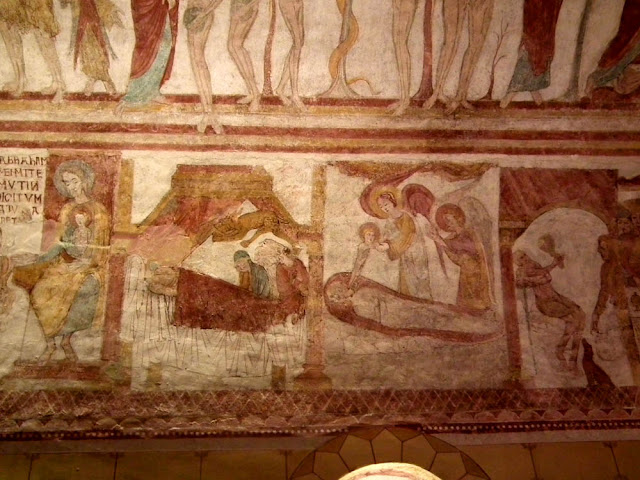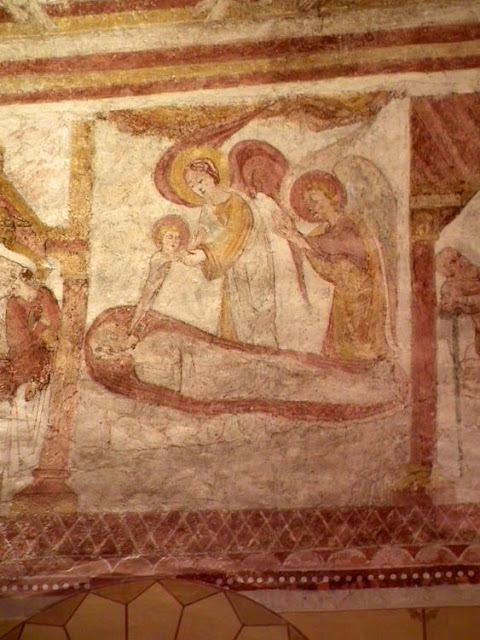While I don't have much to write about I'm republishing some posts. This one is about a remarkable series of wall paintings in the church in Lignières en Touraine and deserves a reposting.
***************************************
The final scene in the sequence of Christ being tempted by the Devil. I love the slightly sheepish aspect of the Devil and the somewhat peeved expression on Christ's face -- both are thinking 'oh no, not again...'
One morning in late March we were sitting around in the lobby of the Hotel Diderot in Chinon, waiting for our clients to finish breakfast. I noticed that there were some leaflets on the side table for a church with wall paintings that I had never heard of, so I picked one up and was immediately intrigued by what I read. By good luck the church was exactly on the route we planned to take with the clients, so we asked them if they would be interested in stopping there. We told them we had never seen this church, but it looked fascinating. They readily agreed, and so we made the wonderful discovery together.
A wider view of the various temptation episodes.
The church of Saint Martin in Lignières en Touraine is situated between Azay le Rideau and Langeais. It dates from the 12th century and inside is like a mini Saint Savin. The wall paintings are contemporary with the oldest parts of the church, but have been retouched several times, in the 13th and 14th centuries. They were professionally restored and conserved in 2008-09. The church is open every day and entry is free. If you want to illuminate the painted ceiling you press a button that gives you about 10 minutes of lighting.
Abel is blessed by a disembodied arm.
The paintings are utterly captivating. You don't need to be overly familiar with your Bible stories to identify what the paintings are illustrating, and anyway, there is a brief, but excellent guide (in French and English) available for visitors to read and fill in any details they are unsure of.
Panels from the parable of the rich man and Lazarus. The rich man has died (centre left) and the monsterous dog like Devil lies in wait to take him to Hell.
Decorating the arch as you enter the apse is a series of boxes representing the months of the year. Lengthwise down the barrel vaulted ceiling are a series of 'cartoon' style stories -- Christ being tempted by the Devil, the story of Adam and Eve and the expulsion from the Garden of Eden, and the parable of the rich man (Dives) and the poor man (Lazarus). Over the altar is Christ in Majesty. On one of the window surrounds is Cain and Abel. The stained glass is 19th century, and the theme of the window now bears no relationship to the theme of the painting surrounding it, resulting in a disembodied hand blessing Abel. Antoinette explains in her post on Chez Charnizay that this was a convention to avoid having to portray God.
The angels gently and lovingly receive the soul of Lazarus, the poor man.
Naturally I immediately alerted Antoinette to the existence of this church, in the hope that she and Niall would go to visit soon and write one of their erudite posts about it. I am pleased to see that they have obliged.
Looking straight up, showing the story of Adam and Eve above and the rich man and Lazurus below.
************************************************
For details of our private guided tours of chateaux, gardens, wineries, markets and more please visit the Loire Valley Time Travel website. We would be delighted to design a tour for you.
We are also on Instagram, so check us out to see a regularly updated selection of our very best photos.
We are also on Instagram, so check us out to see a regularly updated selection of our very best photos.







6 comments:
These murals are magnificent and reminiscent of Saint-Savin. Do you think there could be a connection?
I don't think so particularly. I think they are a couple of generations apart and stylistically a bit different. I've not heard there was a connection. The thing that is notably similar is the range of pigments, but the drawing style between the two is distinguishable -- not the same 'school'. But of course, coming from a very similar aesthetic.
In the case of the chapel de Tous les Saints and others, do we know why the paintings were, at one point in time, recovered whith a layer of chaux<?
Sheila asks the same question on Ken's blog today.
Two reasons usually. They start to look old and tatty but no one has the skills to repaint them and besides they are old fashioned looking. Second sometimes they become inappropriate because dogma changes. So many churches in countries that became Protestant after the Reformation cover up their wall paintings, for example.
thank you, Susan, for this explanation.
Post a Comment